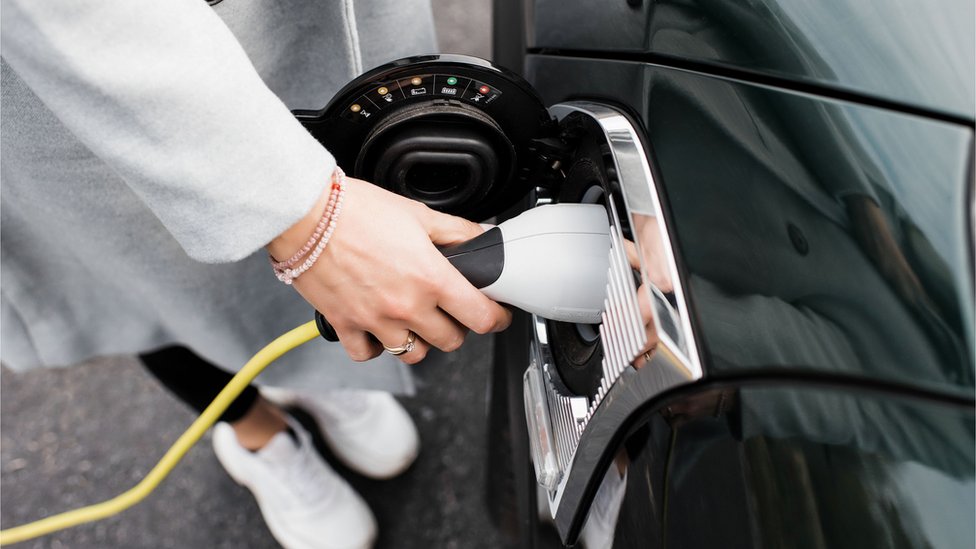
The goal, which revises the government's original target by 10 years, is part of
a wider plan to make the UK carbon neutral by 2050.The RAC said the UK's charging network would need to grow "exponentially" to cope as electric vehicle sales surged.
Trade body the SMMT urged better incentives to cut the costs of cars.
However, most welcomed the ban, with AA president Edmund King saying: "With considerable investment and focus, the electric revolution could flourish".
Plans for a ban on the sale of traditional petrol and diesel cars were first announced in 2017, as part of a strategy to clean up city air. It was meant to take effect in 2040.
In February, that target was brought forward to 2035, as the government sought to burnish its environmental credentials ahead of a now-postponed UN climate summit in Glasgow.
Now the target has been revised again - although plug-in hybrid vehicles will have a stay of execution until 2035.
Announcing the plan on Tuesday, the government also promised:
- £1.3bn to accelerate the rollout of charge points for electric vehicles in homes, streets and on motorways across England
- £582m in grants for those buying zero or ultra-low emission vehicles to make them cheaper to buy and incentivise more people to make the transition.
- Nearly £500m to be spent in the next four years for the development and mass-scale production of electric vehicle batteries.
Cost challenges
Meeting the 2030 deadline will be a challenge for the car industry. In 2019, there were 2.3 million new cars registered in Britain, but only 37,850 were battery powered - or 1.6%.
Sales have risen rapidly this year, partly due to strict new emissions rules in the EU which have forced manufacturers to invest billions in new zero-emission models.
As a result electric cars have become better, but they remain expensive to make and rely heavily on incentives to sell.
Mike Hawes, boss of the Society of Motor Manufacturers & Traders (SMMT), said new government incentives were welcome but were "just the start of what's needed if we are to remain competitive - as an industry and a market".
"Success will depend on reassuring consumers that they can afford these new technologies, that they will deliver their mobility needs and, critically, that they can recharge as easily as they refuel."
Charging issues
There are currently 20,197 public charging points in the UK, in 12,724 locations, according to ZapMap, and the number is increasing rapidly. A growing proportion are high-powered rapid or ultra-rapid chargers.
However, there is no doubt many more will be needed if millions of petrol and diesel cars are to be replaced by battery models each year.
The RAC's head of roads policy, Nicholas Lyes, said many drivers found electric cars "daunting" due to concerns about their range and the lack of charging points.
"Some of these problems will disappear as the average range of electric vehicles increases, but it's vital that the government continues to invest in developing a fast, reliable and widely available network of chargers that support electric vehicle owners no matter what their circumstances or travel plans."
Ian Johnston is chief executive of Osprey, which is building a network of rapid chargers around the country. It has installed 182 so far, and currently has funding to build 2,000.
He insists drivers can be confident there will be enough to go around, "because there are now a number of private entities investing hundreds of millions of pounds in deploying thousands of public charging points each year".
However, he adds that the government will need to ensure it creates "a competitive marketplace at key locations, such as motorway service stations".
Brexit worries
Ian Plummer, commercial director of Auto Trader, says surveys carried out by his company show that although having somewhere to charge an electric car is still a serious concern for would-be buyers, "the key barrier to mass adoption remains upfront cost".
He thinks that failing to reach a post-Brexit trade deal with the EU would make this problem much worse.
"Tariffs of around 10% will be applied to cars coming into the UK, so the cost of electric vehicles could be as much as 30% more than what consumers are used to spending on petrol or diesel cars today."
Rebecca Newsom of environmental group Greenpeace, meanwhile, welcomed the ban being brought forward, saying it could be "a major milestone in the fight against the climate crisis" which could put Britain "in pole position in the race to seize the jobs and economic opportunities of an electric future".
"electric" - Google News
November 18, 2020 at 07:39AM
https://ift.tt/2IL9pfi
Shift to electric cars will need 'Herculean' effort, says industry - BBC News
"electric" - Google News
https://ift.tt/2yk35WT
https://ift.tt/2YsSbsy
Bagikan Berita Ini














0 Response to "Shift to electric cars will need 'Herculean' effort, says industry - BBC News"
Post a Comment